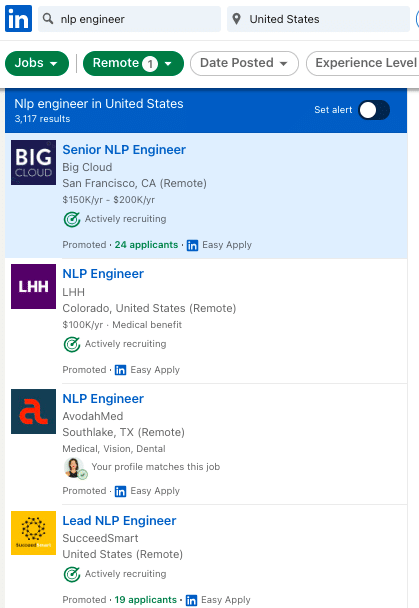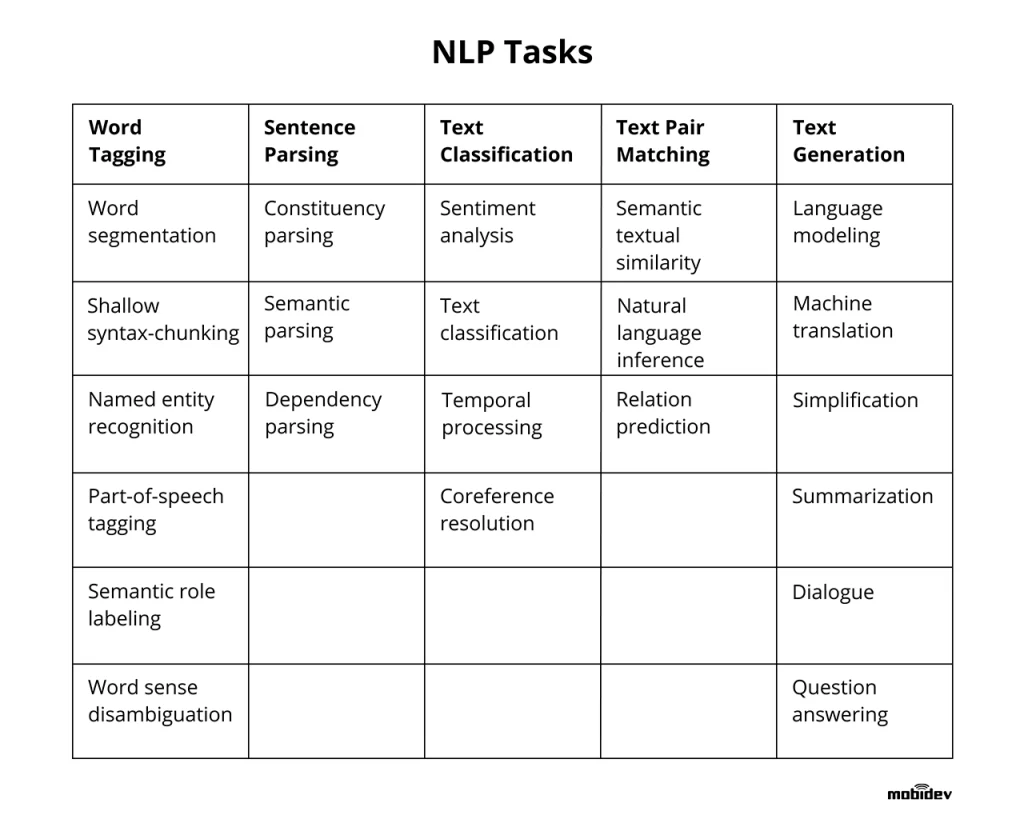As a technical specialist, an NLP engineer is responsible for empowering businesses to process information in natural languages. An NLP engineer solves the problems of analyzing and extracting information from texts, including ML methods.
However, his tasks may not be limited only to the field of machine learning, as some of them require in-depth knowledge of mathematics, linguistics, and the theory of algorithms. And, of course, an NLP engineer must be a good programmer. To analyze and extract data from texts, it is necessary not only to answer many engineering challenges but also to be able to correctly organize such data.
Relationship between mathematics and linguistics
Let’s make it clear: in this specialty, one cannot exist without the other.
In the work of an NLP engineer, the two sciences are connected through the need to create a mathematical model of natural language.
Modern computers can only understand numbers and logical operations. Text processing requires the description of linguistic patterns and rules in a machine-understandable language. A developer can’t solve all the problems with the knowledge of mathematics and programming solely. The developer is obliged to own the subject area with which he works – linguistics.
In other words, if a mathematician-linguist does not understand English, then he will not be able to write a rule that will act on the processing of cases in a text.
Starting a profession
To decide upon the direction of study, you need to understand which of the areas you are interested in:
- If your goals include the independent invention of innovative technologies in AI, then the university needs to be specialized in mathematics with an in-depth study of Data Science and Deep Learning.
- If you strive to solve applied and business problems and are ready to use existing solutions, then you should give preference to software development and ML infrastructure. Industrial development languages include C++, C#, Java, and others. The area of expertise is the development of distributed systems. MLOps tool is an infrastructure for automating work with machine learning: MLFlow, AirFlow, and so on.
But in both cases, it is necessary to know and feel the language well. Without the basic knowledge of linguistics, NLP engineers can’t execute the quality work of the logical rules and machine learning models. Any natural language, including English, is constantly evolving – new words and concepts, stable phrases appear, the information background changes, and many previously important contexts become statistically insignificant. That’s why it is necessary to constantly adapt linguistic logic and algorithms to the variability of the language. In addition to literacy, it is important that a person is oriented in the relevant business context and understands what and how to evaluate.
Not all companies are ready to hire specialists without practical experience. Personally, when hiring developers, we give preference to those who have previously been associated with word processing. At the same time, we are happy to take guys from universities to the department of linguistic processing to work on the quality of text markup. There, students learn specialties and master tools.

Personal qualities and professional skills that an NLP engineer needs
Profile skills, without which the specialist is unable to perform the tasks:
- Knowledge of specialized mathematical base
- Basic understanding of the English language (morphology, semantics)
- Knowledge of programming at the middle level and above
- Knowledge of Python, especially for an NLP engineer
- The ability to find the simplest solution is always the best
- Understanding machine learning algorithms: neural networks, clustering algorithms, logistic regression
- Knowledge of industrial development languages: C++, C#, Java
Personal qualities allow you to effectively perform work tasks and move up the career ladder. The most basic are:
- Ability to work with people
- Leadership skills
- Attentiveness
- Desire to deepen knowledge in different areas of IT
- Stress resistance: the work is not easy
- Responsible approach to work
For NLP specialists, this happens in the process of work. To achieve results, it is necessary to master new tools and improve existing algorithms and rules. Specialists improve their skills continuously. To implement new functions and solve problems, knowledge in related fields is needed. All of these lead to vertical and horizontal career growth. Of course, the level of wages directly depends on work experience and specialization: the narrower the profile, the higher the demand for the employee.
The work of an NLP engineer in practice
NLP engineers can divide their work into two areas:
- Planned tasks for the development and support of existing system functions.
- Research tasks. Within their framework, they develop a strategy for improving business processes and testing analytical hypotheses.
The first block is related to the support of the logical core of the system. Rules and language models are described in a high-level industrial programming language and allow us to extract the knowledge from text documents, that are later provided to clients.
There is a problem with the definition of direct speech. Many patterns have been described to determine direct speech based on the analysis of the corpus of news texts. They contain various parts of speech and constructions that can be semantically interpreted as speech markers: reported, said, stated, by message, by information, according to research.
To determine the boundaries of direct speech, the exact work of the parser is necessary. In addition to the direct definition of direct speech and its boundaries, it is required to perform a number of specialized actions on entities that are the authors of direct speech. For example, remove the tonality from them: if an organization is the author of a study in which a negative conclusion is made, then this company should not be negative, even contextual. All this requires the development of special logic and tools for working with linguistic models of documents.
The second block is the use of artificial intelligence to solve business problems. Engineers are responsible for developing new subsystems that use both Deep Learning neural network technologies and classical machine learning algorithms from collecting and analyzing test data to testing hypotheses and delivering trained models to commercial operation.

To assess the quality of problem-solving, NLP engineers use many indicators. The main ones are accuracy and completeness. They are calculated on the basis of a specially prepared data sample.
Suppose you need to classify news and divide it into technical, such as reports of financial markets, as well as non-technical:
- We collect news with references to stocks, quotes, tickers;
- We mark this selection manually: documents that are definitely technical and those that are not;
- We divide the resulting sample into two parts: training and test in the ratio of 70 to 30;
- We train the model on the training set and test it on the test set;
- We look at quality indicators and conduct cross-validation;
- We conduct expert testing on industrial data;
- We draw conclusions.
Why are NLP engineers the future of information retrieval services?
The word processing business especially needs such specialists. It is necessary to constantly adapt to the variability of natural languages and the information background. Therefore, engineering efforts are concentrated on creating the most versatile technological solutions. And they often represent a symbiosis of various technologies. The people who own them will always be at the top.



